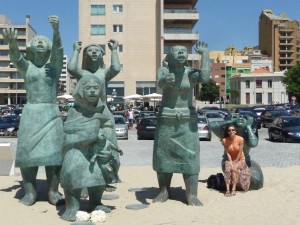Wine travels: Discovering Port along the Douro

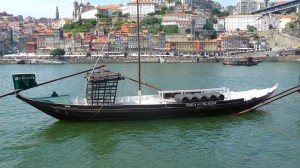
A popular and affordable tourist attraction in Porto, Portugal is a relaxing, hour-long cruise aboard a rabelo—a replica of a boat that used to ship port from the Douro Valley to Vila Nova de Gaia. Viki Eierdam.
Portugal is less traveled than neighboring Spain but, for wine enthusiasts, it affords an exciting pilgrimage—tasting Port in its birthplace. This fortified sweet wine comes in several styles including white, ruby and tawny and works well as an aperitif, end of meal drink or in combination with a cheese plate or chocolates depending on the flavor notes. Port is actually stored in Vila Nova de Gaia—separated from Porto by the Douro River and a walkable distance regardless of which city you choose to lay your head thanks to the double-decked Dom Luís I Bridge.
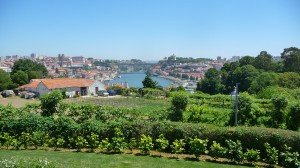
As the last lodge in the line up, Graham’s affords sweeping views of Vila de Gaia to the right and Porto, Portugal to the left separated by the Douro River. Viki Eierdam
In Vila Nova one has a veritable feast of Port wine lodges to tour and producers to sample from. W & J Graham’s—established by two brothers in 1820—is the last one in the lodge line-up and the hike up the hill affords sweeping vistas of the area. After a 45 minute tour, where guests pass over 2,000 oak casks and 40-222 gallon oak vats called tonels, several tasting choices are available at Graham’s but that’s not the case everywhere so choose wisely. Expect the pours to be generous and the tour guide to be entertaining and knowledgeable.
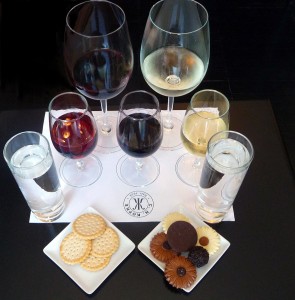
Kopke overlooks the entire waterfront of Vila de Gaia. This tasting option is an impressive plate filled with a red wine, white wine and five ports paired with crackers and chocolates as appropriate. Viki Eierdam
When tasting Port in its birthplace, know that most people either have a favorite and tour that lodge or hop around learning a lot of repetitive information. I married my illuminating lodge tour with a tasting only at Kopke’s tasting room where, again, a menu of options is available. Position yourself at the window seat to drink in their stunning waterfront view while enjoying an impressive presentation of wines and ports paired with crackers and chocolates.
Be sure to take in such sights as Sé Catedral; browse the traditional Bolhão Market; linger over afternoon tea at elegant Majestic Café (circa 1921 Art Nouveau café); admire blue-tiled buildings (dating back to 1763 and beyond) known as azulejo; head inside Lello & Irmao bookstore whose center staircase can only be described as something out of The Hobbit; meander the promenade on either side of the River; and enjoy a lazy, hour-long cruise aboard a rabelo—a replica of a boat that used to ship port from the Douro Valley to Vila de Gaia—as it floats along the Douro.
A pleasant metro ride away from Porto is the neighborhood of Matosinhos with a popular swimming beach and fish-focused restaurants. This is an excellent opportunity to discover another of Portugal’s wines—vinho verde; literally green wine that pairs beautifully with the plates of clams and mussels overflowing tables during a relaxing, traditional Portuguese lunch.
Since Port claims the only wine-growing region in the world where the product is grown in one location and aged elsewhere, make a point to spend a couple nights in one of the two larger towns up the Valley—Peso de Régua or Pinhão—to view what is said to be the largest mountainous wine-making region. The distinctive stepped terraces that rise from the valley floor to flank both sides of the river leave little doubt.
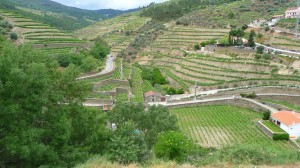
Distinctive stepped terraces rise from the valley floor to flank both sides of the Douro River between Peso de Régua and Pinhão. Viki Eierdam
This area is dotted with quintas which are the estates where grapes are grown and many of them provide tourist accommodations as well as gastronomic adventures in their regionally-inspired dining rooms. Likewise, charming airbnbs and a smattering of hotels can be found.
For more information on the Douro Valley, go to www.dourovalley.eu/en/.
**If you like what you’re reading, follow Corks & Forks by clicking the ‘Follow’ button or follow Corks & Forks on Facebook.

